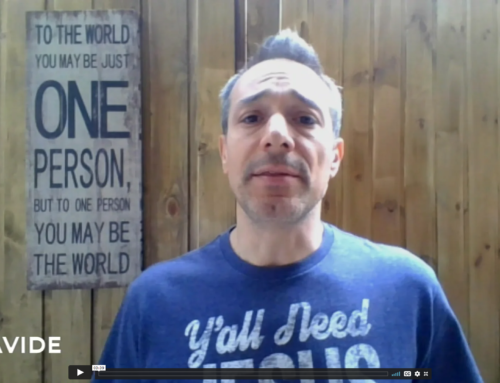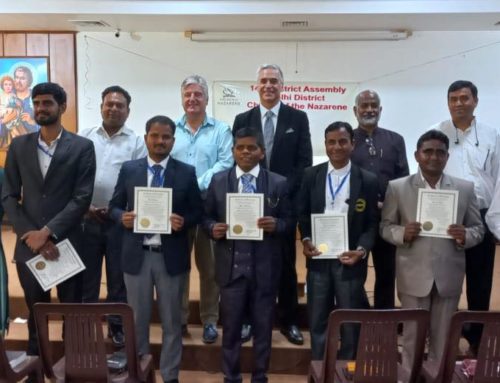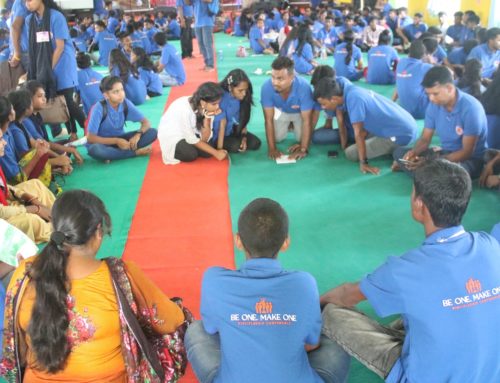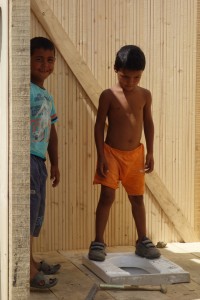
Photo Courtesy Christian Bangert
Up on top of the hill, the kids are just the same as other kids. They laugh and cry, they sing with us and listen to our stories, they enjoy the games and love colouring pictures, and they get themselves all messy at crafts’ time. It’s very hot on the hilltop and the sun burns out of a cloudless sky, but sometimes a breeze stirs the air, cools the hot little faces that are eagerly watching us, taking pleasure in every part of the program. And when they’re happily occupied with crafts or crayons, we gaze about us, at the stunning panorama – wooded slopes, green hillsides and misty blue mountains in the distance, a small lake here and there, wild flowers at our feet.
It’s when the kids’ program is over and we leave our secluded hilltop, walk down the few steps to the settlement, that stark reality hits us. ‘Our kids’ are not returning to happy homes, caring hands, cool drinks and a healthy lunch, or an afternoon nap on a soft bed.
From the path, we gaze down at the settlement: a few makeshift huts, constructed out of things that others have discarded, overlooking the main trash dump of the city of Tirana, Albania’s capital. Huge mounds of plastic bottles and bags are piled between the huts and people are moving among them, carefully sorting through the garbage, separating items, filling huge sacks with sorted trash – this is how they make a living. There’s a sickly-sweet scent of refuse in the air and a choking odour of hot plastic.
The children run down the path, towards their homes, but they’re not greeted with warm embraces and there’s no filling lunch waiting for them. Are they loved? we wonder. We do not know. But that’s why we’re here: to show these children and their families that they’re loved, that they’re precious – to us, and to their Creator.
From 8th to 18th August 10 German young adults travelled to Albania as part of a “paXan” team, an annual Work & Witness trip for young adults that has served in a number of different countries in the past years. It is usually made up of 10 to 20 young adults (18–30 years old) from Nazarene churches all over Germany. This August, the paXan team served in a Roma community in Sharrë on the outskirts of Tirana. The Roma are descendants of so-called “gypsies” and live in close-knit communities all over Europe but are frequently marginalized and treated as second class citizens.
“As a team we were able to achieve our goal: to show the people in this Roma community on the trash dump that they’re valued and loved,” Dennis Lieske, one of the team members, reported. “As ‘second class citizens’ they don’t usually feel valued or loved. This is also something they find difficult to pass on, even to their children. The kids program we conducted on five mornings therefore was an important key to the hearts of these people.”
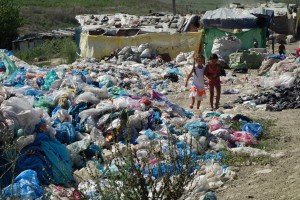
Photo Courtesy Christian Bangert
But the paXan team didn’t just play with the kids. In order to demonstrate to the families in a tangible manner that they are loved and valued, the team worked hard every afternoon and late into the evenings, digging a well for more accessible drinking water and constructing two latrine facilities in the settlement. In addition, a program including regular after-school assistance for the children and vocational training for young adults is in the planning stages.
Vera, who serves as minister to the mission church in this community, was very excited about the team’s visit, emphasizing how she had hoped for 15 years that a group would come to help and praising God for his intervention and perfect timing. When the latrines were finished and presented to the Roma families on the last evening, their response made it clear that they were especially impressed by the fact that these young people had worked so hard for them all week.
“With a lot of joy and fun at work as a team, by serving and loving our neighbours we were able to reach the hearts of the Roma families and we enjoyed wonderful fellowship together as a team,” Jennifer Mattler, another paXan participant, summarized the trip.
For the team members themselves, the trip was as great a blessing as to the families they served. “In the end, we learned in particular that we may expectantly wait for God’s help. Not everything turned out the way we had hoped. But we could experience God at work in many ways,” Lieske said. “And His love and esteem for each individual are far greater than any pile of rubbish!”

